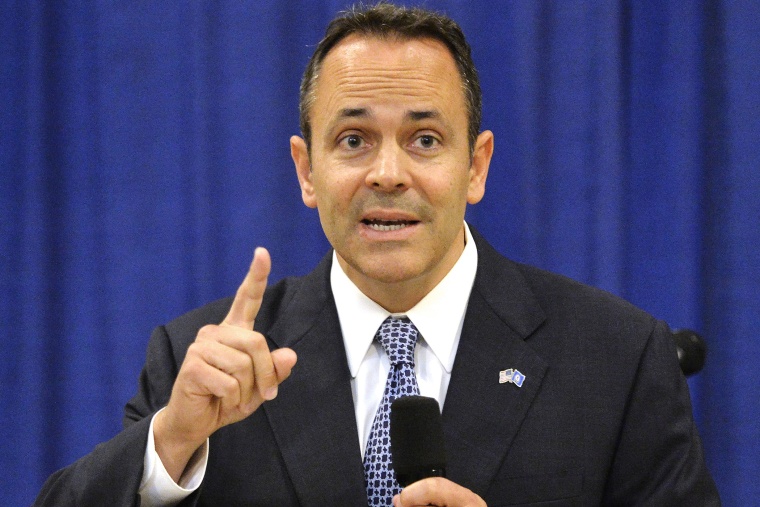For several years, Kentucky was so effective in implementing the Affordable Care Act, the Bluegrass State became a national model in health care governance. Then voters replaced Gov. Steve Beshear (D) with Matt Bevin (R) -- and the latter got to work undoing what had been done.
Not only was Kentucky's exchange marketplace scrapped, but the new Republican administration sought new ways to place restrictions on Medicaid beneficiaries, which the Trump administration endorsed.
A federal court, however, reached a different conclusion. The Lexington Herald-Leader reports:
The ruling blocks Gov. Matt Bevin's administration from implementing the change, which was scheduled to start Monday in one Northern Kentucky county and extend to most of the rest of the state by the end of the year.Sixteen Kentucky Medicaid recipients sued the federal government in January to block Bevin's planned changes to the state's Medicaid program. The plaintiffs claim that Bevin's plan -- known as Kentucky HEALTH -- should not have been approved; they say it violates the 1965 law establishing Medicaid because it will reduce poor people's access to health care.
The full ruling is online here (pdf). Judge James Boasberg clearly wasn't impressed with the defense's arguments.
"Although the secretary is afforded significant deference in his approval of pilot projects like Kentucky's, his discretion does not insulate him entirely from judicial review. Such review reveals that the secretary never adequately considered whether Kentucky HEALTH would in fact help the state furnish medical assistance to its citizens, a central objective of Medicaid," Boasberg wrote. "This signal omission renders his determination arbitrary and capricious. The Court, consequently, will vacate the approval of Kentucky's project and remand the matter to HHS for further review."
So, now what?
In Kentucky, Matt Bevin basically announced an ultimatum: if he couldn't impose work requirements on Medicaid beneficiaries, he'd scrap Medicaid expansion in the state altogether, stripping hundreds of thousands of his own constituents of their health care benefits.
It's hard to say whether the first-term governor was bluffing, and it'll take a while before we find out: Bevin's administration will appeal today's decision and the Republican won't follow through on his threat until the legal options have been exhausted.
Kentucky is trying to become the nation's state to impose these requirements, and as Jeffrey Young explained, this gives the controversy added national weight:
More than 60 percent of adults with Medicaid already work. Most of the remainder would fail under exemptions to the proposed work requirements because, for example, they're "medically frail" or serve as a full-time caregiver to children. Kids, pregnant women, the elderly and people with disabilities are completely exempt from the work requirements.Under the plans approved for Kentucky and other states, however, nearly all working-age adults without disabilities would still have to prove they're working or meeting the alternate requirements for 80 hours a month. This bureaucratic hurdle would create significant new costs for states and serious burdens for the low-income people who use Medicaid, who would be at risk of losing coverage if they failed to report their work hours to the states.If work requirements were in force nationwide, as many as 4 million people would lose Medicaid coverage, the Kaiser Family Foundation projects.
Today's ruling means the national regressive push has been halted, at least for now.
